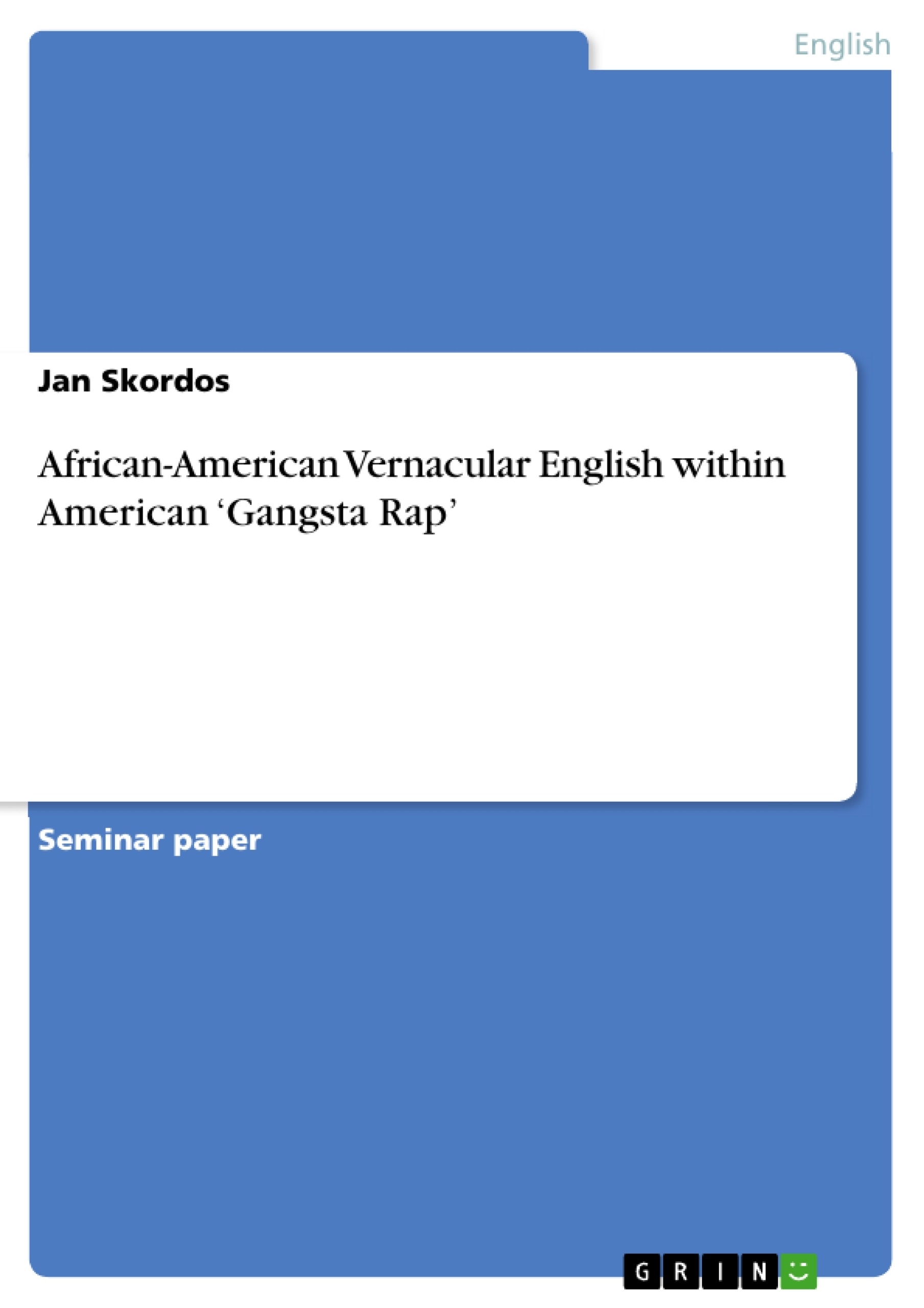This abstract shall give another piece of the puzzle to what is considered to be African-American Vernacular English. With scientific aid of well-known concepts by linguists such as Green in particular but also Wolfram, Schilling-Estes, Mufwene and Poplack we want to focus on specific grammatical features of AAVE and to what extend these can be recovered in the Hip-Hop subgenre of American West Coast Gangsta Rap. A small but significant text corpus of four representative songs (added to the appendix in the shape of lyrics) cover the source for a quantitative and qualitative evaluation. The given text shall give a short overview about the origin and different theories on AAVE first and will further on primarily adapt the characteristic linguistic features L. Green and Wolfram & Schilling-Estes worked out and apply them to our little song text corpus.
Inhaltsverzeichnis (Table of Contents)
- Introduction
- What is African-American Vernacular English?
- The Question of Origin
- Linguistic Characteristics of AAVE
- Absence of copula for contracted forms of is and are
- be indicating recurring activity or state
- ain't for isn't or didn't
- Third person -s absence in present tense
- done indicating completed activity
- Data Analysis
- The Nature of Gangsta Rap
- AAVE represented in American Gangsta Rap
- Copula absence of is and are
- be indicating recurring activity or state
- ain't for isn't or didn't
- Third-person ―s absence in present tense
- done indicating completed activity
- Conclusion
Zielsetzung und Themenschwerpunkte (Objectives and Key Themes)
This abstract aims to examine the grammatical features of African-American Vernacular English (AAVE) as they appear in the "Gangsta Rap" subgenre of American West Coast Hip-Hop music. By drawing on the research of linguists like Green, Wolfram, Schilling-Estes, Mufwene, and Poplack, the paper analyzes a small corpus of four representative songs. The abstract first provides an overview of the origin and development of AAVE, discussing different theories on its origins and its status as a dialect or an independent language. It then focuses on specific grammatical features of AAVE, highlighting their presence in the chosen song lyrics.
- The origin and development of African-American Vernacular English (AAVE)
- The linguistic characteristics of AAVE, particularly grammatical features
- The representation of AAVE in American West Coast Gangsta Rap
- The analysis of specific grammatical features of AAVE within a corpus of Gangsta Rap songs
- The impact of AAVE on the language and culture of American Hip-Hop
Zusammenfassung der Kapitel (Chapter Summaries)
- Introduction: The introduction provides a brief overview of the abstract's objective, which is to examine the presence of AAVE features in Gangsta Rap music. It also mentions the research approach, focusing on a limited corpus of song lyrics.
- What is African-American Vernacular English?: This chapter discusses the diverse terminology used to describe AAVE and introduces the term "African-American Vernacular English" as the preferred choice. The chapter further explores the ongoing debate regarding the origins of AAVE, considering various perspectives: the Creolist View, the Substrate View, and the Anglicist/Dialectologist View.
- Linguistic Characteristics of AAVE: This chapter focuses on the specific grammatical features of AAVE that the abstract will investigate. It briefly introduces the concept of copula absence, the use of "be" to indicate recurring activity or state, the use of "ain't" for "isn't" or "didn't," the absence of the third-person "s" in present tense, and the use of "done" to indicate completed activity.
Schlüsselwörter (Keywords)
This research paper focuses on African-American Vernacular English (AAVE), its grammatical features, and their representation in American West Coast Gangsta Rap. Key concepts include copula absence, "be" indicating recurring activity, "ain't" for "isn't" or "didn't," third-person "s" absence, "done" indicating completed activity, and the linguistic analysis of a small corpus of song lyrics. The paper aims to contribute to the understanding of the linguistic diversity of American English, particularly within the context of popular music.
- Arbeit zitieren
- Jan Skordos (Autor:in), 2009, African-American Vernacular English within American ‘Gangsta Rap’, München, GRIN Verlag, https://www.grin.com/document/167287



